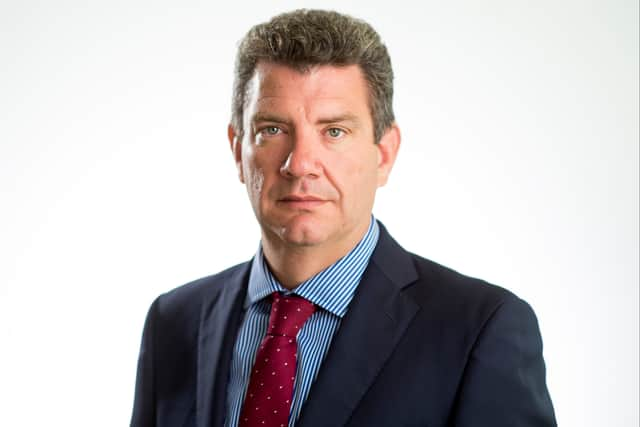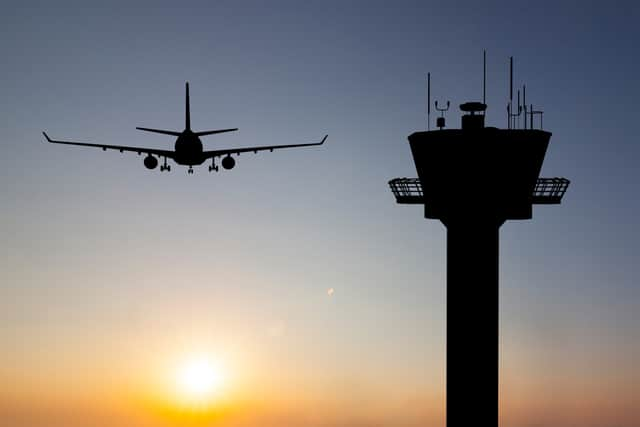How much does NATS CEO Martin Rolfe earn? Pay rise explained as flights cancelled by air traffic control fault
and live on Freeview channel 276
UK travellers are waking up to yet another day of cancelled flights and widespread delays at airports following a technical fault with the country’s air traffic control systems on Monday (28 August).
While some carriers have launched repatriation flights, many British people are stuck in airports all over continental Europe and beyond. Airlines should be offering some stranded passengers accommodation, although many people have been forced to sleep on terminal floors.
Advertisement
Hide AdAdvertisement
Hide AdIt all comes after dodgy flight data caused computers at National Air Traffic Services (NATS) - the part-public owned operator of much of the UK’s air traffic control system - to crash. Former British Airways boss Willie Walsh told BBC Radio 4’s Today programme on Wednesday (30 August) that the incident “demonstrates a considerable weakness” in the systems NATS uses to keep flyers safe.
The dire situation has put the company’s boss Martin Rolfe under pressure to explain why the meltdown was so catastrophic. It has also raised questions about why he received a huge bonus just weeks before the incident, particularly since the company admitted it still uses “ageing systems” and that it was at fault for a significant uptick in delays for passengers in 2022.
So, who is Martin Rolfe - and how much has he been paid as NATS CEO? Here’s everything you need to know.
Who is Martin Rolfe?
Martin Rolfe, 51, is the CEO of National Air Traffic Services (NATS). He’s been in post since 2015 and previously served as the company’s managing director for operations from 2012.
Advertisement
Hide AdAdvertisement
Hide AdHe is an engineer by trade, having obtained a master’s degree in aerospace systems engineering from the University of Southampton in 1994. His career began at the European Space Agency (ESA), where he worked in orbital mechanics.


By 2006, he had become defence contractor Lockheed Martin’s director of aviation programmes. In 2008, he was promoted to managing director of the company’s civil aviation wing - a position that meant he dealt with air traffic management systems.
Who owns NATS?
As CEO of NATS, Rolfe heads up a 48.9% government-owned company that dealt with 2.24 million UK flights in 2022. The firm controls the airspace at 15 airports across the UK, including Heathrow, Gatwick and Manchester.
The other major shareholder in the company, with a stake of 41.9%, is a consortium of airlines (The Airline Group Ltd) which is made up of British Airways, EasyJet, Tui, Virgin and Lufthansa. The Pension Protection Fund and Universities Superannuation Scheme also hold shares, while London Heathrow has a 4.2% stake. The remaining 5% of shares are held by NATS employees.
Advertisement
Hide AdAdvertisement
Hide AdHow much does Martin Rolfe earn?
As the boss of a company that generated almost £1 billion in revenue during the 2022/23 financial year, Martin Rolfe receives a sizeable paypacket for his job.
His basic pay totalled £477,000 for the year - a modest 3% (£10,000) year-on-year increase after a Covid pandemic-induced three-year pay freeze. NATS’s remuneration panel said the rise marked a “return to normality”. It came after Rolfe gave up 5% of his salary in 2020 when pretty much all UK aircraft were grounded as a result of Covid-19.
Alongside his regular salary, Rolfe also had access to £14,000 in benefits, including a car allowance and private medical and dental care, as well as £72,000 towards his pension. But while his basic pay remained relatively restrained, his bonuses skyrocketed. With NATS posting a 1,600% increase in pre-tax profits over the past year (a rise from £8.7 million to £148.5 million), Rolfe pocketed a £281,000 annual bonus as well as a £555,000 bonus for hitting the company’s long-term financial and climate change targets.
This £836,000 package more than doubled his income for 2022/23, bringing his total paypacket to £1.4 million - a 96% (£686,000) increase year-on-year. This percentage dwarfs the average wage increase UK workers are getting amidst the cost of living crisis, and is even well above the typical hike in executive pay.
Advertisement
Hide AdAdvertisement
Hide AdBut while the company’s financial performance proved to be lucrative for its CEO, passengers were on the receiving end of significant delays that were directly attributable to NATS. In 2022, it recorded 10.2 ‘delay seconds per flight’. Given the company handled 2.24 million flights that year, this figure amounts to 6,347 hours of delays - a total equivalent to 8.7 months of planes sitting on the tarmac or circling an airport.


The previous year saw 0.3 delay seconds per flight with 1.29 million flights handled. This translated to more modest delays for travellers of 107.5 hours. The last time delays were this bad was in 2018, when 12.5 delay seconds per flight were recorded - albeit across 2.52 million flights.
In its latest annual report, NATS admitted it was using “ageing systems”. Despite adding that new kit is on the way, it said it is finding it “harder” to find personnel with the “key engineering skills” it requires to deliver its air traffic control services.
Given the latest disruption to UK flyers as a result of NATS’s technical glitch, the tally for 2023 is likely to show standards slipped yet further at the same time as Martin Rolfe trousered a hefty pay rise.
Comment Guidelines
National World encourages reader discussion on our stories. User feedback, insights and back-and-forth exchanges add a rich layer of context to reporting. Please review our Community Guidelines before commenting.
